
New measures to strengthen and boost funding for an EU scheme to provide free fruit, vegetables and milk to schoolchildren have received the backing of the European Parliament’s agriculture committee, which has also resolved to place more emphasis on educating children in healthy eating as part of the planned changes.
“A healthy, balanced diet is the foundation of good health but the consumption of fruit, vegetables and milk has been declining across the EU. This is why it is of the utmost importance to strengthen the school fruit, vegetables and milk scheme by increasing its budget and making it more focused on healthy-eating education,” said Marc Tarabella, who has been responsible for steering the legislation through Parliament and led its negotiating team.
Parliament has ensured the financial stability of the programme by preventing member states from unilaterally cutting its budget or changing the criteria for allocating EU funds among themselves.
The agriculture committee endorsed the deal struck between Parliament's negotiators and the Luxembourg Council presidency on 10 December by 30 votes to six, with one abstention.
With €150m per annum set aside for the distribution and promotion of fruit and vegetables, MEPs have also insisted on a fairer distribution of EU funds between member states by setting two core criteria for the entire scheme; these are the share of six to 10-year-old children in the population and the degree of development of the region within the member state.
Greater emphasis on education
To make the EU school scheme more effective, MEPs insisted that member states must do more to promote healthy eating habits, local food chains, organic farming and the fight against food waste.
The educational measures should also better connect children with agriculture, for example through farm visits and the distribution of local specialities such as honey and olives.
Parliament also stated that, when foodstuffs are distributed in schools, under-consumed, local and fresh products should have priority over processed foods.
Member states will be able to distribute processed foods like soups, compotes, juice, yoghurts and cheese only in addition to fresh fruit and vegetables and milk or lactose-free milk.
Only products with a healthy nutritional content can be distributed. Added sweeteners and artificial flavour enhancers will be banned, while distribution of products with added sugar, salt and fat should be allowed only as an exception, MEPs said.
Products containing added fruits, nuts or cocoa, such as chocolate milk or yogurts with fruits, and flavoured foodstuffs will still be eligible for EU funding under the school scheme.
The agreed text of the scheme still needs to be approved by Parliament as a whole at its March or April plenary session, before going to the European Council for approval at first reading.



